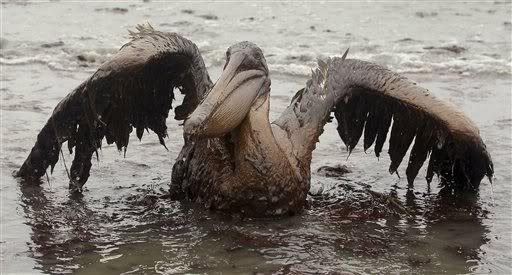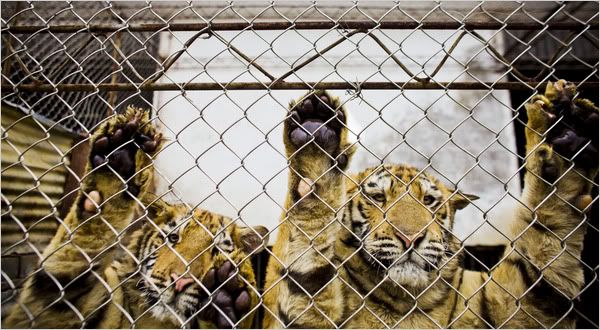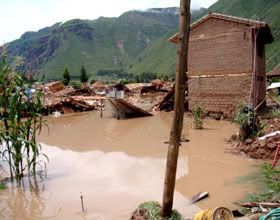We’ve all had a month to stew about this. The Gulf of Mexico is slowly turning into a petroleum gumbo laced with oil coated pelicans and dead dolphins. We’ve been watching a slow motion train wreck. Except it’s not just two colliding steam engines. No. No such luck. It’s the Gulf of Mexico, teaming with life, and its currents are moving the spilled oil around. Eventually it will be everywhere. And while we’re watching that unfold, and seeing clumps of tar and oil all over the beaches, we are beginning to suspect that, hard as it is to believe, maybe nobody, that’s right nobody, knows how to plug the leak. And stop the spill. So we’re going to have to watch a colossal ecological disaster we are utterly helpless to stop. Or mitigate. The signs are already everywhere, preparing us for a spectacle of wildlife and oceanic death, slowly breaking to us the very bad news we really don’t want to hear.
Just look at this from AP:
Oil spill frustration is rampant.
The White House is being pounded for not acting more aggressively in the month-old oil spill disaster in the Gulf of Mexico. The administration is hitting back, mostly at BP. Louisiana is threatening to take matters into its own hands. The truth is, the government has little direct experience at either the national or state level at stopping deepwater oil leaks – and few realistic options.
With the oil flowing and spreading at a furious rate, President Barack Obama has accused BP of a “breakdown of responsibility.” He named a special independent commission to review what happened.
But the administration seems to want to have it both ways – insisting it’s in charge while also insisting that BP do the heavy lifting. The White House is arguing that government officials aren’t just watching from the sidelines, but also acknowledging there’s just so much the government can do directly.
“They are 5,000 feet down. BP or the private sector alone have the means to deal with that problem down there. It’s not government equipment that is going to be used to do that,” Coast Guard Commandant Thad Allen told a White House briefing on Monday.
This is a recipe for a most horrible outcome. Our frustration today is absolutely nothing compared to what is coming. What is coming is the largest man made environmental disaster in history. This is going to make Chernobyl look like Three Mile Island. This is going to make Exxon Valdez and Santa Barbara look like a joke.
The administration has stated that it is going to have “a special independent commission” “review what happened.” But I don’t need no stinking commission to know what happened. We’ve been over it and over it and over it. That’s all back story anyway. If the Gulf of Mexico dies, as surely it will from enough oil, “what happened” is going to be the least of anyone’s concerns. It’s going to be a footnote in a narration of the extensive misery and suffering that the spill has caused.
Meanwhile, the Secretary of the Interior supposedly has his foot on the throat of BP. And the government continues to rely on oil company “expertise” to deal with the spill. But the Interior Department was still apparently granting permits for underwater drilling even after he declared a moratorium on that. And we’re already being told that the feds can supervise and direct BP, but that they aren’t capable to doing anything on their own. Look at this. The Coast Guard’s guy who’s in charge of this federal emergency response is saying that it’s BP or the private sector that has “the means to deal with that problem”, not the government. If you kick them out of the way, who will take over? Nobody, he claims. I asked before and I ask again, whether this is the first time that a claimed foot on the throat has been confused with fellatio.
No, the administration isn’t going to elbow BP aside. Ever. Absolutely not. No matter what. We’re already being told that BP, the fourth largest corporation in the world, has all the “means to deal with that problem,” and that the rest of us can just sit here and watch the largest man made ecological disaster in history slowly, but inexorably unfold. And the expertise, we’re being told, is all in the hands of the oil companies. They’re doing, so we’re told, all they can do.
There are some very, very smart people in the United States. I’d like to tell you that they can be quickly called together to solve this problem. That it’s that big a disaster that unconventional approaches are required. But I don’t think that’s going to happen. I don’t think the administration will take over the efforts to close the spill. I don’t think anything will change in the way this disaster is being handled until much later. Until we’ve been made physically and emotionally sick by the condition of the Gulf of Mexico. Then maybe things will change. If it’s not too late.
simulposted at The Dream Antilles and dailyKos






